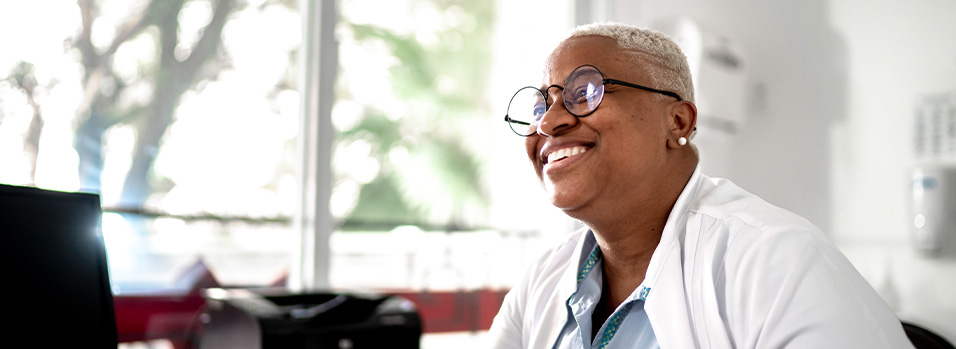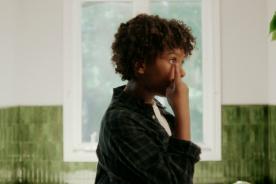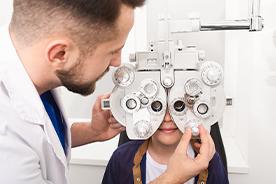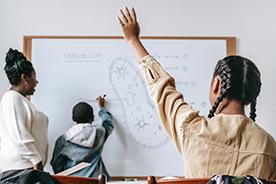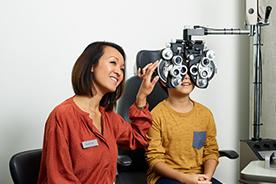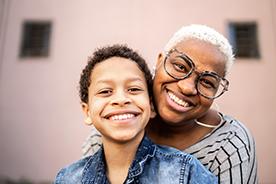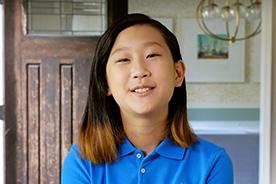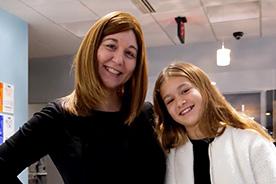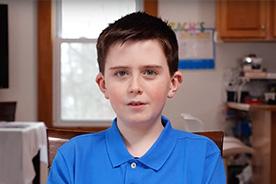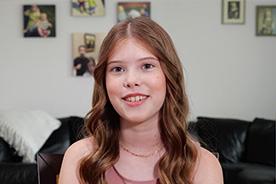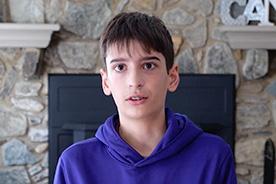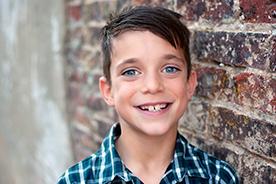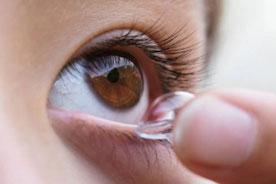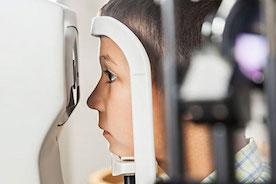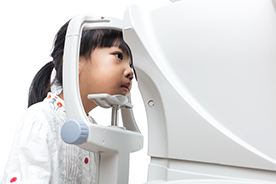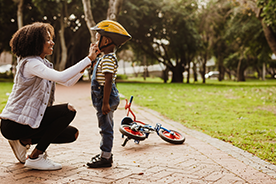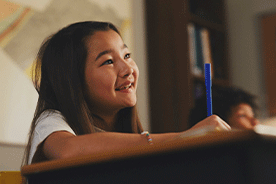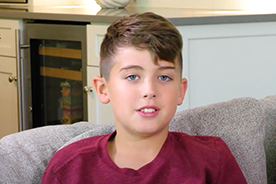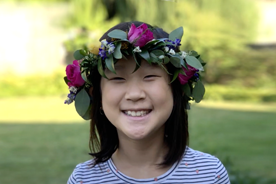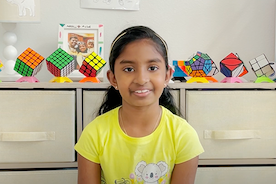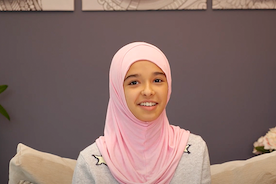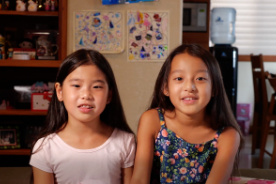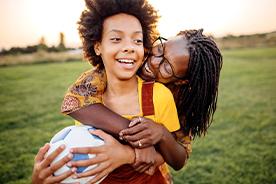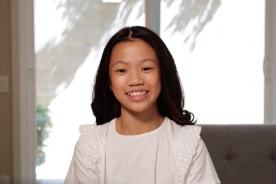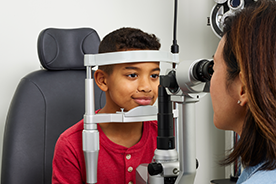With any doctor’s appointment for your child, you want to leave with basic answers about their health. That’s especially true when it comes to eye exams if your child has been diagnosed with myopia—also known as nearsightedness. Their doctor will want and need you to be involved in the decision-making process, which means they want you to be well informed. And to do that, you should feel comfortable asking questions if you’re unclear about something or need more information.
Whether it’s your child’s first or fifth appointment, here are 10 general questions to consider asking your child’s eye doctor.
1. What is my child’s current visual acuity?
A visual acuity test checks your child’s vision and shows how well they can see.1 You’re likely familiar with this test if you’ve ever been asked to read a wall chart of letters or symbols during an eye exam or in your health care provider’s office. This is the quickest way for a provider to tell if your vision has changed, particularly with nearsightedness.1 Visual acuity measured in each eye is one of many tests that are especially important for children because vision problems can develop at any age and may go unnoticed if not tested.2 It is important to note that farsightedness will not usually be picked up on a visual acuity test.
Detection and treatment of early vision problems may help reduce the risk of more serious eye conditions in the future and improve your child's overall quality of life.2
2. Does my child show any signs or risk-factors of nearsightedness/myopia?
Your eye doctor can provide information about the signs and symptoms of myopia, such as headaches, blurred vision or squinting, as well as other vision-related issues.3 They can also assess the risk at which your child may develop myopia in the near future.
3. Does my child have any signs of other eye conditions or diseases?
Parents can monitor for changes in their child’s vision and behavior, like holding objects closer to their face than usual or sitting closer to the television, or tilting their head, but an annual eye exam evaluates a child’s vision and eye health even if there are no clear signs or symptoms of myopia or other eye issues.3
Comprehensive eye exams can detect potential problems early and help ensure your child receives appropriate care and treatment. Many eye problems are not obvious to the average parent—that’s why following the recommended exam schedule is so important.4
4. Does my child need glasses or contact lenses?
Whether or not your child needs glasses or contact lenses depends on the results of their comprehensive eye exam, which takes into account their individual prescription, eye muscle coordination, focusing ability, visual demands and the conversation you have with their doctor. You’ll likely know before you walk out the door if your child needs glasses or contact lenses.
5. If I wear glasses or contacts, will my children eventually have to wear them, too?
Although myopia is heavily influenced by environmental factors like screen time, outdoor time and exposure to natural light, we know it can run in families, too.5 Studies have found a link between parental myopia and a child's risk of developing myopia.6
Regardless of a parent’s vision status, children should see an eye doctor annually or as scheduled by their doctor, starting in infancy, to monitor any changes in their vision and eye health.4
6. Are there activities that can help my child’s vision?
Some things that affect vision—like lifestyle, sleep habits and following a recommended eye exam schedule starting in infancy—are within your control. But others aren’t, like genetics and how fast your child’s eyes grow, which are different for each child. Activities within your control that can help your child’s vision or help prevent it from worsening include taking breaks from screens and reading to blink and look far away, as well as spending two hours a day outside if you can. If that feels too hard to achieve with your schedule, try 20 minutes, 45 minutes—whatever you can work into your child’s routine.7
It's important to note that while certain activities can be beneficial for your child’s eye health, they aren’t a substitute for professional eye care. Regular eye exams and consultation with your eye doctor or optometrist are still the best way for your child to maintain good eye health and minimize the risk of potential problems.8
7. Do I need to protect my child’s eyes from ultraviolet (UV) rays?
Protecting your child’s eyes from UV rays is important for maintaining good eye health, whether you’re at home or on the go. Your child’s eye doctor will share ways your child can protect their eyes based on their activities, your environment, the weather and season, and upcoming travel plans.7 Children’s eyes are more vulnerable to UV damage than adults.9
8. How often should my child have their eyes examined in the future?
While the frequency of eye exams can vary based on the child—given their age, risk factors, family history and baseline findings—it’s important to discuss your child’s individual needs with their eye doctor or optometrist to determine the best schedule for future eye exams.
Generally speaking, children are evaluated by their pediatricians during the first few months of life to identify any obvious eye concerns. After that, children should complete an eye exam with an eye care provider between 6 and 12 months old for a comprehensive evaluation. Then, children should be examined again by their eye doctor at 3-5 years old and before entering school as a kindergartener. The American Optometric Association suggests children have their eyes examined every two years after that if no vision correction is required.10 Children who need eyeglasses or contact lenses should be examined annually.11
Your child’s eye doctor is the best resource to determine the ideal frequency for your child, and it’s different for each child.
9. Are there any changes I can make to my child’s diet or lifestyle to improve their eye health?
There isn’t a large enough body of evidence to say that nutrition plays a big role in the progression of myopia. But there is good evidence that sleep does.12
Dr. Justin Kwan, OD, FAAO, Senior Manager of Myopia Management at CooperVision, says that the time children go to sleep and how long they sleep impacts myopia much more than nutrition. “If they are in bed before 9:30pm and sleep at least eight hours, that’s best. If they are up past 10pm and sleep less than 8 hours, that’s more risk-inducing.”
Also, the more time children get outside the better when it comes to eye health. Dr. Kwan recommends taking children on errands and to the park to help reduce the risk of developing myopia. Even in that short time, they’ll be outside a little more than they would be otherwise.
10. Is there anything else I should know about my child’s eye health?
As children grow and develop, so do their eyes. Studies have shown that myopia worsens the fastest in younger kids.13 By staying informed and taking steps to promote good eye health, you can give your child the support they need for their eyes.
Remember that your child’s eye doctor is there to help and answer any questions you may have. If you suspect your child may have myopia, don’t hesitate to ask about treatment options during the appointment to help prevent their vision from getting worse so quickly. Whether it’s glasses or contact lenses, your child’s eye doctor can give you the answers you need during their appointment.
If you’re looking for a certified eye care professional, click here.
To see firsthand what your child may be experiencing if they have nearsightedness, click here.
For myopia, your child’s eye care professional may recommend a perscription for MiSight® 1 day, a contact lens that’s clinically proven to slow the progression of myopia in age-appropriate children.14 These daily wear, single-use contact lenses are the first and only FDA-approved* lenses to slow the progression of myopia when prescribed for children 8-12 years old at the initiation of treatment.†14

